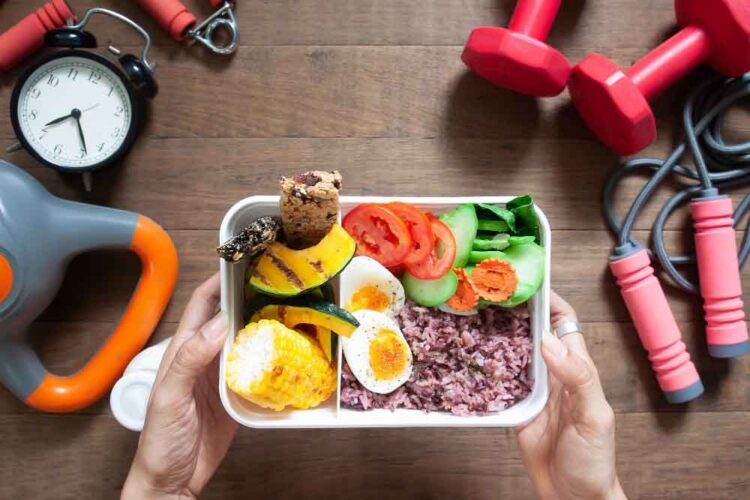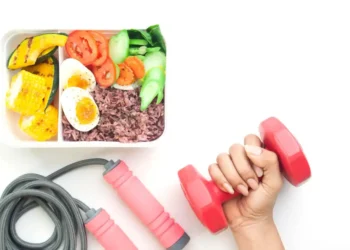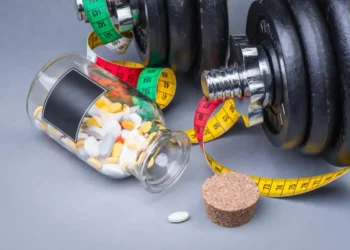It’s crucial to know that recovering well is just as vital as actually working out when you lift weights. Ignoring recovery may slow down your muscle growth and up the chance of getting hurt. We’ve gathered 15 tips, all proven by science, to help you recover better from weightlifting.
These tips will guide you on the best nutrition, rest, and what to drink. You’ll learn about must-have supplements and healthy habits to follow. They all aim to make your muscles stronger and more resilient each time you lift.
Key Takeaways:
- Proper recovery is essential for weightlifters’ muscle growth and injury prevention.
- Follow these scientifically-proven tips to enhance your weightlifting recovery.
- Include the right nutrition, hydration, supplements, and lifestyle habits in your recovery routine.
- Prioritize rest days and avoid harmful substances that can hinder your recovery process.
- Consistency and patience are key to long-term gains in weightlifting.
Foods for Muscle Recovery
Eating the right foods is key for people who lift weights. It can heal muscles, help them grow, and make you perform better. After working out, it’s important to plan your meal with care to focus on these goals.
“Eating well is a form of self-respect.”
Protein Post-Workout
Protein is vital for muscle repair and building. Aim for 1.4-2.0 grams of protein per kilogram of your weight each day for strong muscles.
Great protein choices after a workout include:
- Lean meats such as chicken, turkey, or lean beef
- Fatty fish like salmon or tuna
- Eggs or egg whites
- Plant-based proteins such as tofu, tempeh, or legumes
Protein Pre-Workout
Don’t forget protein before your workout too. This food helps your muscles get ready and avoid damage during exercise. Add Greek yogurt, cottage cheese, or protein shakes to what you eat before you exercise.
Carbohydrates Post-Workout
Carbs are needed to refill the energy in your muscles. After a workout, eat carbs found in whole grains, fruits, and veggies for the best recovery. Stay away from sugary or processed carbs.
The perfect meal after working out could include:
- Brown rice or quinoa
- Sweet potatoes or whole wheat pasta
- Fresh fruits like berries or bananas
- Leafy green vegetables or steamed vegetables
Balanced Diet for Muscle Recovery
Protein and carbs are essential, but it’s vital to eat a balanced diet. You should enjoy a wide variety of healthy foods to get all the nutrients you need for a fast recovery.
For example, meals focused on muscle recovery could look like this:
| Meal | Protein Source | Carbohydrate Source | Fat Source |
|---|---|---|---|
| Breakfast | Scrambled eggs | Whole wheat toast | Avocado |
| Lunch | Grilled chicken breast | Quinoa | Olive oil |
| Snack | Greek yogurt | Berries | Almonds |
| Dinner | Salmon | Brown rice | Steamed broccoli |
A balanced diet with proteins, carbs, and fats, plus lots of fruits and veggies, keeps your body strong. This is how you help your muscles recover and stay healthy.
Hydration and Recovery Drinks
Proper hydration is key for muscle recovery, especially during tough exercise in warm or humid weather. You lose water and electrolytes when you sweat. It’s important to replace them and stay at your best. Being well-hydrated also stops cramps, fatigue, and other issues that slow you down.
Cherry juice is a great option for enhancing muscle recovery. It’s rich in antioxidants like anthocyanins, proven to lessen inflammation and muscle soreness. These benefits speed up recovery, letting you come back stronger after hard workouts. Adding cherry juice to your after-exercise routine can mean faster muscle healing and less soreness.
It’s easy to include cherry juice in your diet. You can sip it alone or mix it into a smoothie with fruits and veggies for extra nutrition. Try to drink 8-16 ounces of cherry juice a day for the best muscle recovery results.
But remember, cherry juice is not a full replacement for water. Water is your main source for staying hydrated and supporting your body’s functions. Drink around 1.5 liters of fluid for every kilogram you lose in exercise to recharge and stay hydrated.
In conclusion, proper hydration is essential for muscle recovery. Cherry juice can be a big help by reducing inflammation and muscle damage. However, don’t forget the importance of water and a balanced diet. With the right approach, your body will recover well and perform at its peak.
Supplements for Muscle Recovery
Some supplements can help your muscles recover better after a workout. Two popular ones are creatine monohydrate and protein powder.
Creatine Monohydrate for Muscle Recovery
Creatine monohydrate has been researched a lot. It helps with muscle recovery. Here’s what it can do:
- It improves muscle strength and power.
- It makes your muscles bigger.
- It decreases muscle damage and swelling.
- It helps your muscles get energy back.
To use creatine monohydrate, take 5 grams daily. Be aware, effects can differ for each person. Always talk to a health pro or a sports nutritionist before you start taking any supplements.
Protein Powder for Muscle Recovery
Eating enough protein is vital for muscle recovery and growth. Protein powders make it easy to get more. Here are some types:
- Whey protein: It’s from milk and absorbs fast, great for after a workout.
- Soy protein: Made from plants, it’s complete and good for those avoiding dairy.
- Casein protein: It digests slowly, ideal for overnight muscle recovery.
When picking a protein powder, choose one that suits your diet and goals. Always follow the serving suggestions and adjust how much protein you eat as needed.
In short, both creatine monohydrate and protein powder are good for muscle recovery. But, remember, these supplements are just a part of a balanced diet and exercise plan. Base your nutrition on whole foods like meats, eggs, and legumes. And, always talk to a pro for advice on how to use supplements correctly.
| Supplement | Benefits |
|---|---|
| Creatine Monohydrate |
|
| Protein Powder |
|
Lifestyle Habits for Recovery
To help your muscles recover better, make some lifestyle changes. These include getting enough sleep, trying massage therapy, wearing compression gear, and giving cryotherapy a go.
Sleep for Muscle Recovery
Sleeping is key for your muscles to heal. Your body rebuilds muscles and grows when you sleep. Try to get 7-9 hours of sleep each night. This will help your muscles recover well. Sleep is very important for lifters.
Massage for Muscle Soreness
Massages can work wonders for sore muscles. They increase blood flow and reduce swelling. They also help relax tight muscles. So, getting regular massages can make you feel better. They help your muscles recover and work properly.
Compression Garments for Recovery
Wearing compression socks or sleeves can speed up muscle recovery. They help with blood flow, reduce fatigue, and lessen muscle soreness. These clothes put pressure on your muscles, which can lower swelling. This helps remove waste faster, benefiting your muscle recovery and performance.
Cryotherapy for Recovery
Cryotherapy involves exposing your body to extreme cold for a short time. Athletes use it to recover faster from workouts. It can cut down on pain, swelling, and muscle tiredness. You might want to try cryotherapy or cold showers after training. It could help you feel better and recover faster.
Adding these habits to your after-workout routine can really boost your muscle recovery. They can lessen soreness and help you perform better in weightlifting. Mix proper sleep, massages, compression wear, and cryotherapy. This will help your body heal, so you can achieve more in your fitness journey.
Image: A person sleeping soundly, showing how important sleep is for muscle healing.
Things to Avoid for Muscle Recovery
To help your muscles recover well, stay away from harmful substances. Alcohol and tobacco are two big ones to avoid.
The Impact of Alcohol on Muscle Recovery
Drinking alcohol slows down how your body heals after working out. Here’s a look at the problems it causes:
- It raises your blood pressure, which can stop nutrients from getting to your muscles
- Drinking can make it hard to sleep well, which your body needs to repair itself
- Alcohol doesn’t help your body at all and can make you dehydrated, which is bad for recovery
- Regular drinking can slow muscle healing and up the chances of losing muscle
It’s smarter to avoid or limit how much you drink to help your muscles heal.
The Impact of Tobacco on Muscle Recovery
Smoking also slows down muscle recovery. It does damage in these ways:
- It raises the chance of getting hurt
- Smoking can lead to joint and bone problems, making it harder to work out hard and heal well
Avoiding tobacco will help your muscles recover better. Choosing not to smoke is key.
For people lifting weights, cutting out alcohol and tobacco is a big step. It helps reach fitness goals by letting muscles heal the right way.
Conclusion
Weightlifters need proper muscle recovery to perform at their best and stay safe. By following the tips we talked about, they can boost their recovery. It’s vital to eat protein after workouts to fix and grow muscles.
Also, it’s crucial to keep hydrated, use supplements, live well, and avoid bad stuff. These steps help create a good muscle recovery plan.
Getting better in weightlifting takes time. It’s all about being steady with the muscle recovery advice we shared. This way, lifters will see improvements over time and refine their training.
Muscle recovery isn’t only for the body, but also for the mind. It’s about staying strong and focused. Remember, it’s important to take care of your body, rest well, and feed it right.
To fully achieve your weightlifting dreams, you need to look at the big fitness picture. This means focusing on training as well as resting and recovering. Prioritize muscle recovery for a solid fitness base.
So, care for your body’s recovery time and needs. This approach will help you scale new heights in weightlifting successfully.











